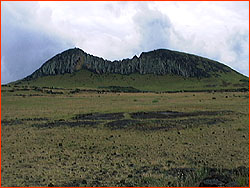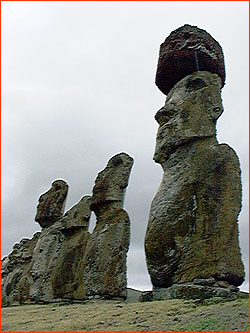
|
 |
 |
 The Team Arrives
The Team Arrivesby Liesl Clark April 20, 1998 It rained all night and most of the day. As we crested the highest point on Easter Island today, weighed down by cameras, lenses, and tripods, it was difficult to hold one's ground against the gale force wind pummeling the exposed land across the island. From the bottom of the ocean to the summit of Easter Island at Terevaka, the land massif rises 10,000 feet. But sea level comes into play somewhere in between, placing Terevaka at about 1,500 feet in elevation above the Pacific. From up there, you can see 360 degrees around the island and you realize just how small this speck of land is. The clouds rolled in, creating a gray ceiling at eye level. We shot some stills and got down as soon as we could, before another rain squall came in from the white-capped sea.  Our team arrives today, both the camera crew for the
documentary film we're making for NOVA, and one of our
scientists,
Dr. Jo Anne Van Tilburg
and her team from California, who will help in the making of a
replica moai from a fiberglass mold. We have chosen our site
for the transport and raising of our moai: at Tongariki, the
site of the largest ahu on Easter Island. Preparation of the
site and the building of the pedestal for the moai will begin
tomorrow.
Our team arrives today, both the camera crew for the
documentary film we're making for NOVA, and one of our
scientists,
Dr. Jo Anne Van Tilburg
and her team from California, who will help in the making of a
replica moai from a fiberglass mold. We have chosen our site
for the transport and raising of our moai: at Tongariki, the
site of the largest ahu on Easter Island. Preparation of the
site and the building of the pedestal for the moai will begin
tomorrow.
Raphael Rapu, an esteemed Rapanui artist and sculptor, will begin carving a top knot, a pukao, for our moai tomorrow. It will be made from the same rock, red scoria, a soft volcanic tuff, as the original pukao that capped many of Easter Island's moai. No one has raised a pukao onto a moai using ancient techniques since early times. As Jo Anne arrives on the island and Raphael extracts rock from the red scoria quarry, a third player in our arena of experts, archaeologist Claudio Cristino, is working out a method for raising the moai with a pukao on top. Will it be raised with the moai, lashed to its head? Or will the one-ton pukao be raised separately? The wind continues to blow and palm fronds snap menacingly; "the wind will bring in good weather," a Rapa Nui man reassures us. And for a brief moment the sky opens up to the north, toward the equator, where the sun breaks through, shedding light on the green hills around us. Lessons Learned (May 11) A New Way to Move a Moai (May 9) Moai is Upright (May 6) Moai Nearly Raised (May 5) A Tourist Attraction (May 3) The Secret of the Sledge (May 2) Moai Ready to be Raised (May 1) The Moai is Moved (April 30) 15-Ton Moai Removed from Mold (April 27) Moai Platform Complete (April 26) Moai Mold is Filled (April 24) Moai Mold Ready for Concrete (April 23) Statue Mold En Route (April 22) The Team Arrives (April 20) Arrival on Rapa Nui (April 17) Photo: Liesl Clark Move a Megalith | Dispatches | Explore the Island | Lost Civilization Resources | E-mail | Table of Contents | Easter Island Home Editor's Picks | Previous Sites | Join Us/E-mail | TV/Web Schedule About NOVA | Teachers | Site Map | Shop | Jobs | Search | To print PBS Online | NOVA Online | WGBH © | Updated November 2000 |